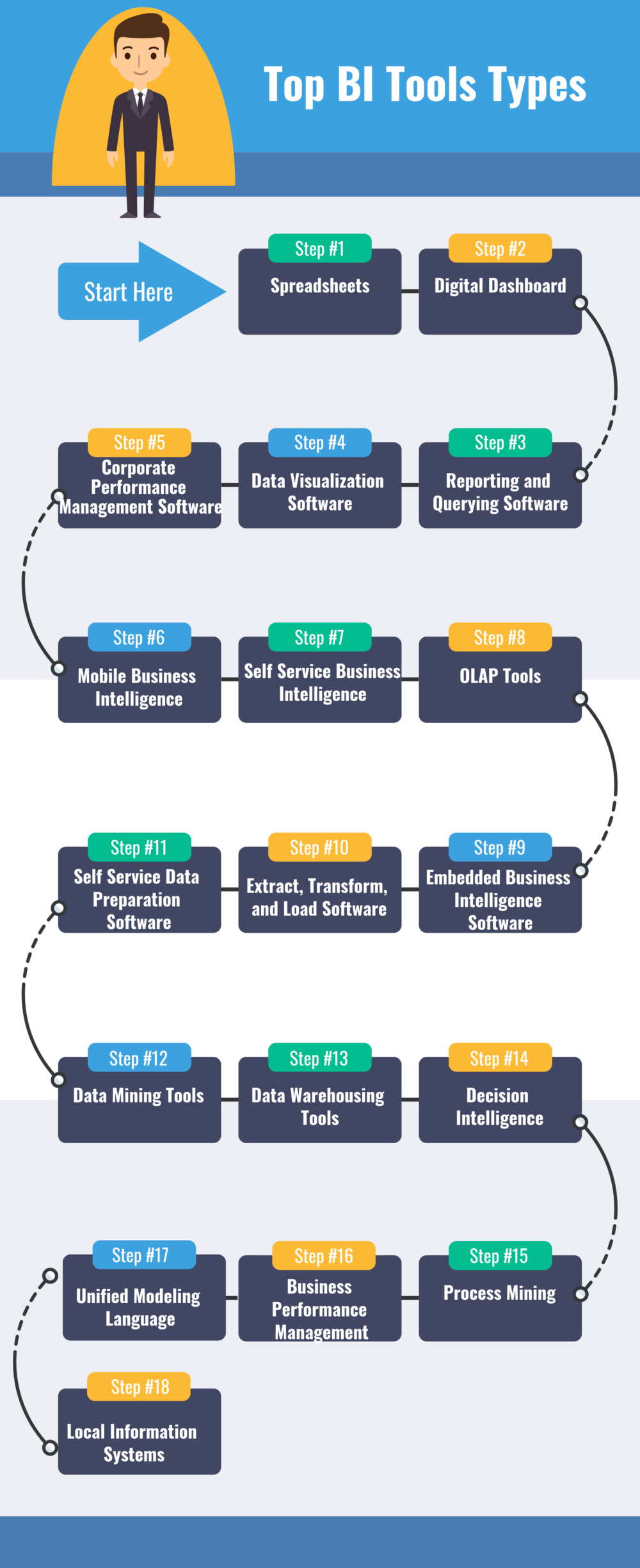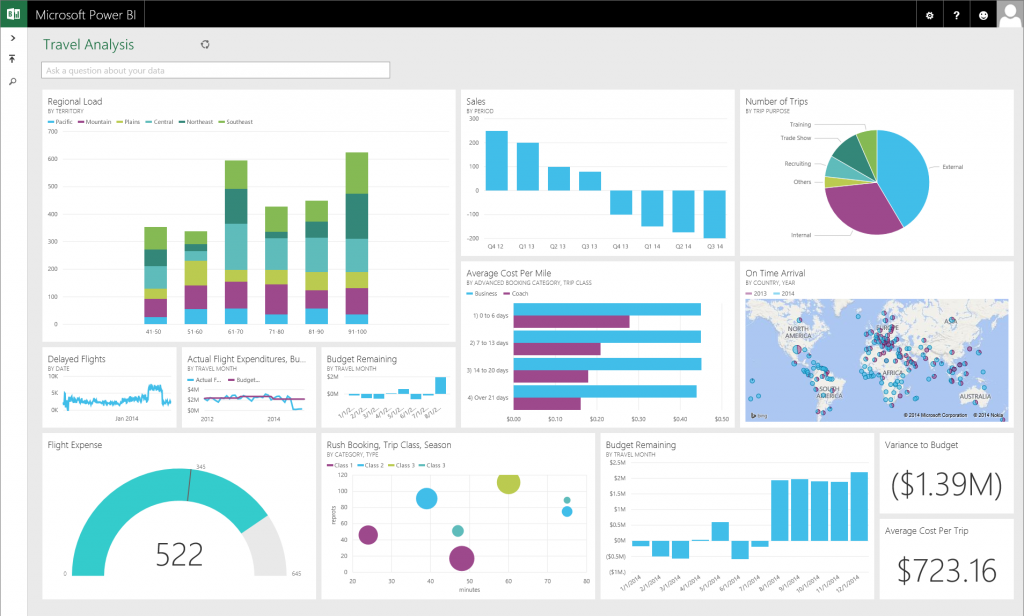Introduction
There’s a reason why they say that “knowledge is power”—particularly in the business world. In this modern age of endless data, business intelligence products have become indispensable tools, providing companies with the power to leverage data to make better decisions.
These cutting-edge solutions take raw data, analyze it for patterns, and present it in a way that’s easy to understand and act upon. From real-time dashboards to interactive reports, business intelligence products empower businesses of all sizes to identify opportunities, anticipate risks, and make data-driven decisions that drive success.
In this article, we’ll delve into the world of business intelligence products, exploring how they can transform your decision-making process and unlock new levels of growth for your business.
Business Intelligence Products: The Key To Unlocking Data-Driven Insights
In today’s data-driven business landscape, organizations are increasingly turning to business intelligence (BI) products to gain a competitive edge. BI tools empower businesses to collect, analyze, and visualize data, enabling them to make informed decisions, identify trends, and optimize operations. From reporting tools to analytics platforms, the range of BI products available is vast and tailored to meet the specific needs of different businesses.
Types of Business Intelligence Products
BI products encompass a wide range of tools and software designed for data analysis and reporting. These products can be categorized into three main groups:
- Reporting Tools: These tools allow businesses to create customized reports that summarize data from various sources. They typically offer drag-and-drop functionality, making it easy to create visual reports without the need for technical expertise.
- Data Visualization Software: These tools take data and transform it into visual representations such as charts, graphs, and dashboards. Data visualization software makes it easier to identify patterns, trends, and outliers in data, helping businesses gain a deeper understanding of their operations.
- Analytics Platforms: Analytics platforms provide advanced data analysis capabilities, including predictive modeling, statistical analysis, and machine learning algorithms. These tools enable businesses to uncover hidden insights, identify opportunities, and make data-driven predictions.
Data Visualization: The Power of Visual Storytelling
Data visualization is a crucial aspect of BI products, allowing businesses to transform raw data into meaningful and actionable insights. By presenting data in a visual format, businesses can easily identify patterns, trends, and outliers that might otherwise go unnoticed. Data visualization tools empower businesses to tell compelling data stories, enabling them to communicate complex information effectively to stakeholders.
Imagine a business that wants to understand the performance of its marketing campaigns. By using data visualization software, they can create a dashboard that displays key metrics such as website traffic, conversion rates, and customer engagement. The dashboard provides a clear visual representation of the campaign’s effectiveness, allowing the business to make informed decisions about future campaigns.
Data visualization is not just about creating pretty pictures; it’s about making data accessible and actionable. By leveraging the power of visual storytelling, businesses can unlock the full potential of their data and gain a competitive advantage in today’s data-driven economy.
**Business Intelligence Products: An Indispensable Tool for Modern Businesses**
In today’s fast-paced, data-driven business landscape, business intelligence (BI) products have become indispensable tools for organizations seeking to gain a competitive edge. These cutting-edge solutions empower companies to transform raw data into actionable insights, enabling them to make informed decisions, optimize operations, and achieve remarkable growth.
**Benefits of Business Intelligence Products**
The myriad benefits of BI products are undeniable. They bolster data accuracy, ensuring that businesses work with reliable and trustworthy information upon which to base their decisions. By eliminating inaccuracies and inconsistencies, organizations can confidently rely on BI products to guide their strategic planning and operational initiatives.
Furthermore, BI products enhance decision-making processes by providing real-time insights into key performance indicators (KPIs). With access to comprehensive data visualizations and interactive dashboards, decision-makers can quickly identify trends, anomalies, and opportunities. This empowers them to make informed choices based on data-driven evidence rather than guesswork or intuition.
Lastly, BI products promote operational efficiency by streamlining business processes. They automate repetitive tasks, such as data extraction, analysis, and reporting, freeing up valuable time for employees. This allows organizations to focus on high-value activities that drive innovation and growth.
**Essential Features of Business Intelligence Products**
To harness the full potential of BI products, organizations need to ensure they possess certain essential features. These include:
* **Data Integration:** The ability to seamlessly connect with multiple data sources and consolidate data from various systems
* **Data Analysis:** Advanced analytical capabilities that enable businesses to explore data, identify patterns, and extract valuable insights
* **Visualization tools:** Interactive dashboards, graphs, and charts that present data in a user-friendly and visually appealing manner
* **Reporting capabilities:** Robust reporting functionality that allows organizations to generate customized reports and share insights across the enterprise
Business Intelligence Products: Essential Tools for Data-Driven Decisions
In today’s data-driven business landscape, business intelligence (BI) products have become indispensable tools for transforming raw data into actionable insights. These products empower organizations to make informed decisions, streamline operations, and gain a competitive edge. With a wide range of BI products available, choosing the right solution for your business is crucial.
Considerations for Choosing Business Intelligence Products
Selecting the right BI product requires careful consideration of several key factors:
First and foremost, ensure that the product is compatible with your existing data sources. Your BI tool should seamlessly integrate with your data systems to extract and analyze data from various sources. Compatibility avoids data silos and ensures a comprehensive view of your business.
User-friendliness is another crucial factor. A BI product should be intuitive and easy to use, allowing both technical and non-technical users to access and analyze data. A user-friendly interface and customizable dashboards empower stakeholders across the organization to leverage insights for decision-making.
Cost-effectiveness is also a primary concern. BI products can range significantly in price. Consider the value proposition of the product and how it aligns with your business needs. Don’t hesitate to compare different vendors and seek references to ensure you’re getting the best value for your investment.
Tableau, Power BI, and Qlik Sense are just a few examples of leading BI products that offer a range of features and capabilities to meet diverse business requirements. These products enable organizations to explore data through interactive visualizations, build reports, and create predictive models. They also seamlessly integrate with popular data sources, such as databases, spreadsheets, and cloud-based platforms.
**Business Intelligence Products: Unlocking Business Success through Data-Driven Insights**
In the cutthroat business landscape of today, companies can barely afford to leave any stone unturned when it comes to leveraging data to stay ahead. Enter business intelligence products, the game-changers that transform raw data into actionable insights.
Business intelligence products empower businesses to make informed decisions by extracting, transforming, and analyzing data from various sources. From customer behavior patterns to market trends, they provide a comprehensive understanding of the business environment. It’s not just about having more data, it’s about having the right data, presented in a way that drives real-time decision-making.
Implementation of Business Intelligence Products
Unlocking the full potential of business intelligence products requires a well-structured implementation. It’s not just about deploying the technology; it’s about ensuring it seamlessly integrates with existing systems, train users to make the most of it, and offer ongoing support to maximize returns. Imagine trying to play the piano without knowing the notes? It’s the same with business intelligence products.
**Data Integration: Linking the Dots**
The foundation of effective business intelligence lies in data integration. Connect disparate data sources whether they’re internal systems, external databases, or social media feeds to create a single, unified view of the business. It’s like assembling a puzzle, with each piece contributing to the bigger picture.
**Training: Empowering Users**
Even the most sophisticated software is only as good as its users. Empower your team with comprehensive training to equip them with the knowledge and skills to navigate the business intelligence platform effectively. Think of it as giving them the keys to a Ferrari – without the training, they’ll just end up in a ditch!
**Ongoing Support: Keeping the Momentum**
Don’t just install the software and walk away. Ongoing support from the vendor or a dedicated team ensures that any challenges are promptly addressed, and users are continuously updated on the latest features and best practices. It’s like having a personal tutor, always there to guide you through the maze of business intelligence.
Business Intelligence Products: A Guide to Data-Driven Success
In today’s digital age, data has become an invaluable asset for businesses of all sizes. To make the most of this information, companies are turning to business intelligence (BI) products. These tools help organizations collect, analyze, and visualize data, providing them with the insights they need to make informed decisions, improve performance, and stay ahead of the competition.
Types of Business Intelligence Products
There are many different types of BI products available, each designed to meet specific needs. Some of the most common include:
- Reporting and dashboards: These tools provide real-time visibility into key business metrics, such as sales performance, customer behavior, and operational efficiency.
- Analytics and data mining: These tools allow users to explore data in depth, identify trends, and uncover hidden patterns.
- Predictive modeling: These tools use historical data to forecast future outcomes, such as customer churn or sales revenue.
- Prescriptive analytics: These tools go beyond prediction to recommend specific actions that businesses can take to improve performance.
li>Data visualization: These tools help users create visual representations of data, making it easier to understand and communicate insights.
Benefits of Using Business Intelligence Products
There are many benefits to using BI products, including:
- Improved decision-making: BI products provide businesses with the data and insights they need to make informed decisions about everything from product development to marketing campaigns.
- Increased efficiency: BI products can automate many data-related tasks, freeing up employees to focus on more strategic initiatives.
- Enhanced customer experience: BI products can help businesses understand customer behavior and preferences, enabling them to provide better products and services.
- Competitive advantage: BI products can give businesses a leg up on the competition by providing them with a deeper understanding of their customers, their markets, and their own operations.
Choosing the Right Business Intelligence Product
With so many different BI products on the market, choosing the right one for your business can be a challenge. Here are a few factors to consider:
- Your business needs: What are the specific problems or challenges that you’re trying to solve with BI?
- Your budget: How much can you afford to spend on a BI product?
- Your technical capabilities: Do you have the in-house expertise to implement and manage a BI product?
- Your data sources: What types of data do you have, and where is it stored?
Implementation and Adoption
Once you’ve chosen a BI product, the next step is to implement and adopt it within your organization. This can be a complex process, but it’s essential for success. Here are a few tips:
- Start with a pilot program: Implement the BI product in a limited scope first, such as a single department or a specific project.
- Get buy-in from key stakeholders: Make sure that everyone who will be using the BI product understands its benefits and is on board with its implementation.
- Provide training and support: Ensure that users have the training and support they need to use the BI product effectively.
- Monitor usage and track results: Keep track of how the BI product is being used and the results it’s producing. This will help you identify areas for improvement and ensure that the product is meeting your business needs.
Conclusion
Business intelligence products are essential for data-driven organizations seeking to improve performance and gain a competitive edge. By providing businesses with the data and insights they need, BI products can help them make better decisions, increase efficiency, enhance customer experience, and stay ahead of the competition.
Saran Video Seputar : business intelligence products




Leave a Reply